Happy Families
What would make you really happy?
Maybe you’re already as happy as could be, but it seems that a lot of people aren’t. A lot of people have their eyes set on attaining or achieving a certain something which will make their life complete. When we’re small that something might be a shiny new bicycle, but as we grow up we get more ambitious: we want a house, we want a car, we want a holiday in the sun… In reality, however, there’s no difference whatsoever between the desires of the child and those of the adult. Whatever it is that has tickled our fancy, we just know that we need that thing, and getting it will be the icing on our cake.
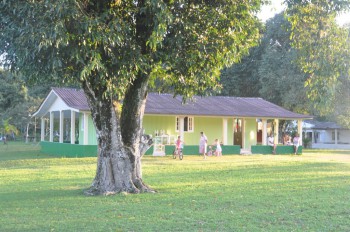
The funny thing is that when they reach the goal people tend to find that their satisfaction is only fleeting. Getting our hands on that coveted commodity was like eating a delicious meal, but all too soon the meal is gone – and the plates are dirty and have to be washed, or the bill has yet to be paid. Worse yet, the taste of the exquisite soufflé is soon gone from our lips and the warm, full feeling passes… and within a few hours we’re hungry again. So it is with ambition and the acquisition of our heart’s desire. After a short while the precious new toy seems rather dull or the newly-won status less impressive than it had looked, and another goal presents itself – like a carrot leading the donkey on. It happens every time – nothing ever satisfies us in that forever-after way that we expect it to! – and yet the majority of people still fall for the ruse over and over again.
This hunger doesn’t only afflict the likes of the average Joe slaving away to earn a new car. Even multi-millionaires feel it – which is why they’re tearing the world apart to get more, more, more capital into their greedy paws. Every moment of every day another slice of Nature is gobbled-up to make more money to feed mankind’s insatiable hunger. By now it should be perfectly obvious to all of us that money does not buy satisfaction. A raise in salary or the purchase of a new car soothes the itch, yet the underlying malady is still there. However, just in case you were in any doubt, I’d like to introduce you to a family who hardly have two pennies to rub together but who are just about the happiest folks we’ve ever met. They live in the little village of Ubá, in southern Brazil.
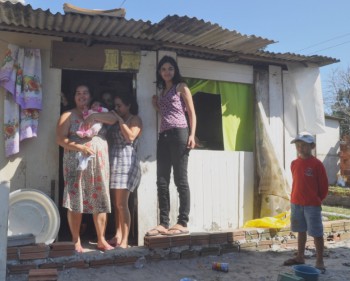
You won’t get to Ubá by road, because there are no roads anywhere in this forested region. However, the people who live here are not Amerindians with painted faces and poisoned arrows in their bows. They may have some indian DNA in their cells but they’re now living in the modern world. They have a primary school, and in the adjacent village, an hour’s walk away, there’s even a secondary school for the 11 to 18 year olds. Both villages are wired into the national grid, and the people also have running water in their homes. They even have satellite TV winging its way to them through the atmosphere. (Brazilians all have TV, and most of them like to leave it running all day. If they could all be persuaded to turn off their tellies when not in use then the nation’s electricity consumption would probably be halved.)
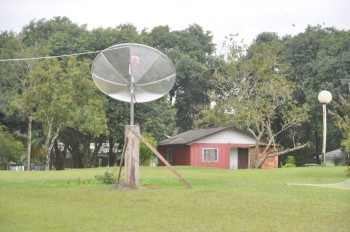
Of course, there are no cars or motorbikes in Ubá; and there are no cinemas, night-clubs, or other entertainments. In fact, there isn’t even a church, although most Brazilian villages seem to have one per every half a dozen homes. The people who live here have to make their own entertainments and find their own meaning to life. They also have to learn how to plan ahead and manage their food stores, because the village shop is not well-stocked. The nearest supermarket is two hours away by canoe, and essentially the shop is there for those who planned badly or who forgot something on their weekly or fortnightly visit to town.
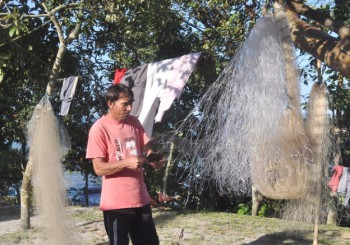
Our friend, Catia, wasn’t born in this village. She was brought up in the nearby city – a busy place with a big port, lots of heavy traffic, and plenty of shops; so she’s no innocent primitive or noble savage. Her dad was an alcoholic who abandoned the family when she was small. Catia’s husband, on the other hand, has lived all his life in this quiet backwater. He’s a subsistence fisherman, earning his living and the family’s food with a couple of small nets. Besides his house, his nets, his crab-pots, the rather elderly TV, and a few sticks of furniture, João also owns a one-man dug-out canoe – and that’s it; that’s his worldly wealth.
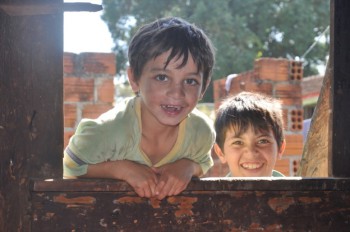
Catia has five children, (three by João and two from a previous marriage) and four of them are still living in the village. When we first met the family, seventeen year old Jolie was heavily pregnant and was just about to be married. She’s now given birth to a baby girl who is Grandma’s pride and joy. Her little aunts and uncles are also delighted, and so too is the father of the child.
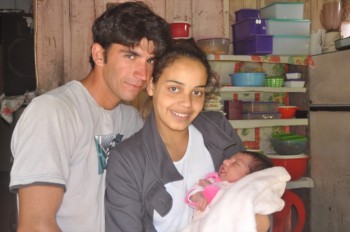
Aged 25, Ezequiel is another fisherman born and bred in Ubá and is a half-cousin of Julie’s. According to Catia, he’d never had a girlfriend before Jolie. To be honest, he didn’t have much chance to become a stud because she’s the only eligible female in the vicinity, but the lack of choice doesn’t seem to have spoilt the couple’s happiness. In fact, it could even be argued that it has actually blocked the opportunity for unhappiness. With no rivals and no distractions there can never have been the opportunity for jealousy, rejection, or any of the other ordeals which so often pertain to romance. Jolie and Ezequiel were simply made for each other – and that’s that.
Money is obviously very tight in this family – a man setting nets and pots from a canoe doesn’t make enough to buy a round of drinks, still less the materials to build a bigger house, or the capital needed to upgrade to a bigger dug-out – and yet there’s not the slightest feeling of impoverishment clinging to Catia or her kids. In fact, there’s a rather bewildering sense of wealth. She neither flaunts her poverty, like someone seeking for charity, nor hides it in shame; it simply isn’t an issue.
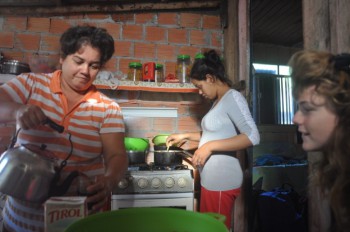
When you cast your eyes around her kitchen – all the while wondering how she even afforded the neat stacks of crockery and the plastic boxes and bowls – you can’t help noticing that this woman is exuberantly happy. Why, I said to myself, she’s as happy as if she dressed in the latest fashions, wore a ton of gold jewellery, and lived in a mansion! What has she got to be so jolly happy about? Shouldn’t she be worrying about where the next meal is coming from? Shouldn’t she be making improvements to her dwelling? Maybe she’s going to want to take us for a tour of the village and charge two dollars per head…
But far from wanting to charge us for anything, Catia sat us down – all six of us, on her three wooden stools and various upturned buckets – and she insisted on cooking us a meal. One day I might open a restaurant on the beach, she mused, and this will be good practice.
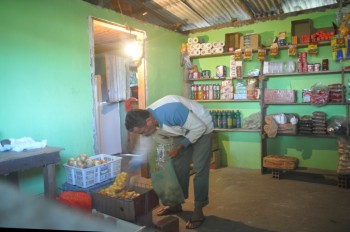
No family in Brazil need ever starve, because the government provides a hand-out which is equivalent to the British system of Child Benefit. However, the bolsa familiar, as it is termed, only amounts to around 13 US dollars per month per school-aged child. Besides this, and the money got from selling fish and prawns, Catia and João’s only other source of income is another small welfare grant which is made to artesanal fishermen. And, of course, the government also provides free health care and free schooling for the kids.
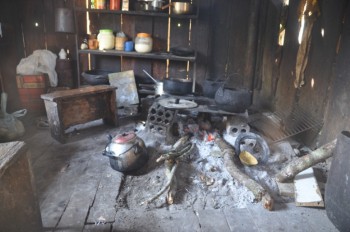
Although the family use it for their lighting, Catia can’t afford to cook on the electricity which the government has brought to this remote village. She has a gas stove – but gas costs money too, so most of her cooking is done on an open fire. (If your only experience of cooking over a fire has been barbecuing burgers, you’ll be surprised at how little wood real people use when cooking in this way.)
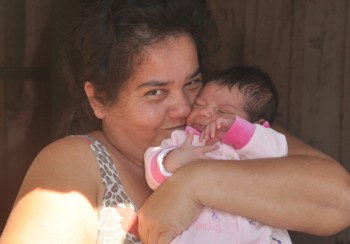
Catia has a basic, open-top washing machine – which is more than I have. In fact, Catia is actually two up on me, because she has also has a fridge and a freezer! With the nearest supermarket ten miles away by canoe, she can certainly justify this acquisition.
With these mod cons, Catia feels that her needs are perfectly fulfilled.
The couple can afford to buy adequate clothing for themselves and their progeny. The kids have no toys to speak of, but they do have a whole village to play in.
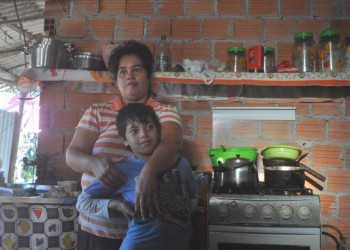
The village is, indeed, the key to Catia’s contentment. Every household here is part of the same extended family, so there’s a real sense of community. People drift in and out of each other’s houses; men help to mend each other’s fishing nets. And when nine year old Lucas took me off into the forest to show me the trees (whose names he knows as well as any naturalist!) we were stopped, not once but twice on the way, by fierce looking aunts and uncles – “Lucas! Where are you going with that strange lady?” Everyone here looks out for everyone else.
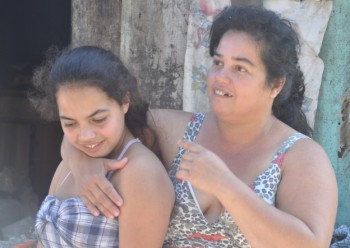
Although the people of this village are all very peaceful and contented, no one else exudes happiness in the way that Catia does – and this is despite the fact that hers is by far and away the crummiest, most tumbledown, crowded house, and her kids are the grubbiest on the block. If you ask her the secret she’ll tell you that it’s because she’s living somewhere very quiet and perfectly safe. Needless to say, there’s absolutely no crime whatsoever in Ubá. “And there are no junkies,” Catia tells us proudly.
Still, I think that this lady’s happiness has another more fundamental source. Take a look at the photos and let me know what you think.
People in Texas who cannot afford to purchase food have the option of getting food supplies from the government by enrolling in this program here texas food stamp application.
